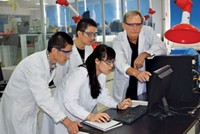Advertisement
Grab your lab coat. Let's get started
Welcome!
Welcome!
Create an account below to get 6 C&EN articles per month, receive newsletters and more - all free.
It seems this is your first time logging in online. Please enter the following information to continue.
As an ACS member you automatically get access to this site. All we need is few more details to create your reading experience.
Not you? Sign in with a different account.
Not you? Sign in with a different account.
ERROR 1
ERROR 1
ERROR 2
ERROR 2
ERROR 2
ERROR 2
ERROR 2
Password and Confirm password must match.
If you have an ACS member number, please enter it here so we can link this account to your membership. (optional)
ERROR 2
ACS values your privacy. By submitting your information, you are gaining access to C&EN and subscribing to our weekly newsletter. We use the information you provide to make your reading experience better, and we will never sell your data to third party members.
Graduate Education
How I made my grad school choices
Current chemistry grad students describe the academic, personal, and aspirational factors that drove their decisions
by Mitch Jacoby
September 9, 2018
| A version of this story appeared in
Volume 96, Issue 36

Credit: Ryan Inzana
COVER STORY
How I made my grad school choices
The chemistry graduate school experience
There’s plenty of expert advice available on what factors students should consider when they think about graduate school (see page 18). But eventually students have to make such decisions for themselves. They have to decide whether and where to attend grad school. And once there, they have to choose a research adviser. So how do students make those decisions?
To get a sense of the answers to that question—anecdotally, not statistically—this Chicago-based C&EN correspondent talked with roughly a dozen second- and third-year chemistry graduate students from Illinois Institute of Technology; Northwestern University; the University of Illinois, Chicago; and the University of Illinois, Urbana-Champaign. That short list includes public and private schools, large ones and small ones, and universities in urban, suburban, and college-town settings.
These students’ paths to grad school differed widely. For example, while Samantha Harvey was still a high school student, she knew she wanted to major in chemistry in college and then go straight to grad school.
Looking back on her teenage years, the Northwestern grad student, who now works with Michael R. Wasielewski and Richard D. Schaller, says, “I just loved chemistry—and also loved my high school sophomore chemistry teacher.” But it wasn’t until the summer after her freshman year of college that she got her first taste of research and an inkling of what graduate school in chemistry would be like. “I realized that I got lucky in my thinking, and it really was what I wanted to do.”
Many students pursue graduate education to set themselves up for better employment opportunities. That was one of the key factors that prompted Rebecca McClain and Nicolas Watkins, both of whom are at Northwestern, to apply to Ph.D. programs. So, too, for Jeremy Schultz at the University of Illinois, Chicago (UIC).
In McClain’s case, a Fulbright fellowship after college led her to work at a pharmaceutical company in Texas. While she was there, she observed the director and assistant director of R&D in action.
“I knew right then that’s the job I wanted,” she says. It was the “autonomy of making decisions” and being able to decide which research avenues to follow that appealed to her. Both directors had a Ph.D., and she understood that the high level of responsibility went hand in hand with an advanced education.
Watkins had a similar experience. He knew little about graduate school until his junior year at Georgia Institute of Technology, when he discussed career opportunities with an academic adviser, he says. Then, while interning at a chemical company in Savannah, Ga., he saw the way his manager, a Ph.D. chemist, interacted with employees at all levels of seniority. That appealed to Watkins.
“I didn’t want to sit in a lab and do titrations all day and report values.” He wanted more responsibility and connectedness with company employees, he says.
Schultz came to the same conclusion about getting a Ph.D. while working at a couple of jobs as a chemist after graduating college. He enjoyed doing R&D work in a yearlong stint at a biotech start-up. But that company shut down abruptly. His next position—doing repetitive quality-control tests at an oil refinery, work he did not enjoy—helped convince him to go back to school.
Advertisement
Young Ju Yun decided to apply to graduate school in chemistry for entirely different reasons. As a beginning undergraduate majoring in biological education in South Korea, she was on track to teach middle and high school biology. As she started taking upper-level biology courses, she found them fascinating. So Yun decided to get a master’s degree in biology to qualify her to teach biology at the university level.
But a number of family illnesses led her to the U.S., where she needed to look after her younger brother, an undergraduate at the University of California, Irvine, who had a brain tumor. “That experience completely changed my life,” she says. She explains that until that time, the biology research she had done, including some related to cancer, seemed strictly like an academic exercise. Her brother’s bout with cancer, however, made it personal. It was then she realized she could use her science education to help improve treatment of diseases.
Now Yun is a grad student at Illinois Institute of Technology studying synthesis of novel organic compounds with photophysical properties useful for applications in biomedical imaging.
For some students, figuring out where to go to grad school and which research group or groups to join can be mighty complicated. For others, not so much. When Maryna Salkovski was a college chemistry major, she thought she wanted to go to medical school. But after shadowing doctors and volunteering in hospital emergency rooms, she changed her mind, deciding instead to continue with chemistry.
She wanted to remain in the Chicago area to be near her family and her boyfriend (now her husband). And because she began looking into grad schools relatively late in her senior year, she missed most schools’ application deadlines. But not UIC’s. So she applied there (and nowhere else) and was accepted.
In contrast, Alexander S. Kurzhals applied to five chemistry graduate programs, similarly to most students interviewed for this story. His reasons for choosing the University of Illinois, Urbana-Champaign (UIUC), were mainly academic: The school ranks highly in chemistry and has active research programs in photochemistry, catalysis, nanoscience, and other areas in which Kurzhals was interested.
But location and size were also factors. Having just graduated from Bellarmine University, a small private school in Louisville, Kurzhals found UIUC’s college-town setting comforting. “Even though it’s a large school, it’s in a small town,” he says. He finds that living in a community where so many of the residents are students, academics, and university professionals is appealing.
Choosing a research adviser turned out to be easy. After listening to Prashant K. Jain speak about his work in a group setting and then following up in a one-on-one discussion, Kurzhals knew that Jain was enthusiastic and genuinely interested in discovering the fundamentals of light-driven chemistry. “I found it very inspiring,” Kurzhals says.
Back at UIC, Schultz was excited by Nan Jiang’s scanning probe microscopy work as soon as he learned about it. But he acknowledges he was concerned about joining the group because Jiang was a new faculty member, was untenured, and at that time had only two grad students. “But Nan was so excited about the research. It was infectious,” Schultz recalls. He adds that because the group is so small, Jiang depends on its members to produce good results and interacts a lot with them, but he does not micromanage. All these factors make for a good work environment, which is really important, Schultz says.
Alexandra Brumberg, a Northwestern student who works with Schaller, agrees about the work environment. She knew that several Northwestern faculty members were doing the kind of nanomaterials work she was interested in pursuing. In deciding which group to join, she says the most important factors were the work environment, the group atmosphere, and the personality of the research adviser.
Those factors weighed heavily in Riki Drout’s decision to work with Northwestern’s Omar K. Farha. By attending group meetings and talking with students and postdocs, Drout was pleased with what she calls the “social aspect” of Farha’s lab. But there was more. “I wanted to have the opportunity to pursue a career in education,” meaning to teach chemistry, not conduct research, she explains. Not all academics support that choice. Some drive their students to become university professors and manage research groups just as they do. Not Farha. He genuinely cares about his students and wants them to be happy with their career choices, Drout says. It’s important to choose an adviser who supports your long-term goals, she adds.
Nearly everyone interviewed for this story said that once they had decided to go to grad school and identified the general research area in which they wanted to work, positive gut feelings that derived from enthusiastic and personable professors and from other graduate students guided them through the remaining decisions. These students and many others like them have made important education decisions that are likely to have a lasting effect on their careers. And just as their choices were influenced by graduate students, professors, and coworkers who were working toward—or already had—a Ph.D., these doctoral students may soon be influencing other young chemists in their decisions about graduate school.





Join the conversation
Contact the reporter
Submit a Letter to the Editor for publication
Engage with us on Twitter